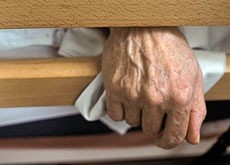Assisted suicide makes waves here and abroad

Zurich's status as a death tourism capital is once again raising hackles in both Switzerland and Britain.
Domestically, there have been calls on the government to regulate assisted suicides and, abroad, a British pro-euthanasia group has raised doubts about the Swiss model.
Since it was set up in 1998, the Dignitas foundation, based in Zurich, has helped 76 Britons commit suicide. It is the only organisation of its kind in Switzerland open to foreigners.
The service offered by the organisation, after an assessment period involving doctors, according to its website, provides so-called members with sodium pentobarbital. The member can then drink this deadly drug in one of two flats in Zurich rented by Dignitas in the presence of the organisation’s volunteers.
Under Swiss law, active euthanasia is illegal but assisted suicide is not. With the latter, the patient has to carry out the final act himself.
Euthanasia, on the other hand, is defined as administering a lethal drug to a person by a doctor or medical staff.
One Briton hoping to use Dignitas’ services in the near future is Noel Martin.
Especially well known in Germany, he was left paralysed from the neck down following a neo-Nazi attack near Berlin 11 years ago.
Having spent the past few years confined to a wheelchair and dependent on carers, Martin announced in 2006 that he would kill himself on his birthday – July 23, 2007 – with the assistance of Dignitas, a charitable foundation based in Zurich.
However, according to recent media reports, Martin has since decided to postpone his exit.
Dignitas’ director, Ludwig Minelli, told the German-language Berner Zeitung that Martin “had not yet booked an appointment” and that the organisation had told him that he could fight racism better if he were alive.
British law
In Martin’s condition, it would be arguably impossible for him to commit suicide without assistance from another person.
However, the legal situation in Britain makes it difficult for anyone assisting someone to commit suicide to avoid repercussions.
The Suicide Act of 1961 makes it a criminal offence to aid, abet, counsel or procure a suicide.
According to the British Dignity in Dying (DID) organisation, this makes assisting another person’s suicide a crime punishable by up to 14 years’ imprisonment.
The most recent efforts to change the law were blocked by parliament in 2006.
DID says that even family members accompanying people, who want to take their lives in Switzerland, could be prosecuted under the Suicide Act back home.
On its website, DID adds that a change in British law would be a “safer option” fthan travelling to Switzerland, particularly as Dignitas has been criticised for helping people to commit suicide, who are neither terminally ill nor mentally competent.
DID spokeswoman Davina Hehir told swissinfo there were no links between Dignitas and her organisation.
“Dignity in Dying does not help or encourage people to go to Switzerland in any way. We understand why some terminally ill people choose to go, though. We are campaigning to change the law [in Britain] so that they aren’t forced overseas to achieve a peaceful death at the time of their choosing,” Hehir said.
Oregon
DID says the Swiss model would not be suitable for Britain and is campaigning for legislation similar to that in the American state of Oregon.
This allows terminally ill state residents to obtain and use lethal medication for self-administration. In all, 292 people have used the law since it came into force in 1997.
Patients must be above 18 years old, capable (able to make and communicate healthcare decisions) and be diagnosed with a terminal illness that would lead to death within six months.
In Switzerland, however, Dignitas appears willing to extend its services to a much broader mix of people, including those who have reasons other than terminal diseases to commit suicide and who may even be mentally unsound.
“We are persuaded that the right to end one’s life is a guaranteed human right. It is our duty… to give the individual… this last freedom to act without fear, risk or pain,” Minelli said last year at a British Liberal Democrat Party convention.
As for Martin, while speaking to the media earlier this year, he appeared relieved at the prospect of taking his life in a Dignitas flat.
“[I will] shut my eyes and wake up in another world,” he told the British Guardian newspaper.
For his part, Minelli told the Liberal Democrats last year that the British authorities alone were to blame for Britons like Martin turning to Dignitas.
“Why do you force your citizens, people in the most terrible circumstances who are determined to end their suffering in a way of their own choosing, to leave your country and travel to Switzerland in order to exercise their free will? Where is the humanity in this policy?”
swissinfo, Faryal Mirza
The Swiss Senate in June called on the government to draft a law aimed at improving controls of organisations offering assisted suicide.
The motion targets the widespread practice of foreign patients, notably from Britain, who come to Switzerland to put an end to their lives.
The House of Representatives – the other parliamentary chamber – still has to discuss the Senate’s request.
Last year the cabinet announced it was not willing to draft a national law regulating euthanasia, saying current legislation was sufficient and the 26 cantonal authorities could draw up their own regulations.
The National Commission on Biomedical Ethics, a government advisory panel, recommended state supervision for organisations such as Exit or Dignitas.
There are some 350 cases of assisted suicide in Switzerland every year, according to the commission.
Switzerland, the American state of Oregon, Belgium and the Netherlands are the only jurisdictions permiting assisted dying in certain cases.
In Oregon, patients who ended their suffering through suicide in 2006 mostly had cancer (87%) and more formal education (41%) than Oregonians who died otherwise.
The median age at the time of death in 2006 was 74 years; 35 patients took the medication prescribed to end their lives.
The most frequently end-of-life concerns were: loss of autonomy (96%), decreasing ability to participate in activities that made life enjoyable (96%); loss of dignity (76%); and inadequate pain control (48%).
Patients requesting a lethal prescription must be 18 years or older, an Oregon resident, capable (i.e. able to make and communicate healthcare decisions) and be diagnosed with a terminal illness that will lead to death within six months.

In compliance with the JTI standards
More: SWI swissinfo.ch certified by the Journalism Trust Initiative



You can find an overview of ongoing debates with our journalists here. Please join us!
If you want to start a conversation about a topic raised in this article or want to report factual errors, email us at english@swissinfo.ch.